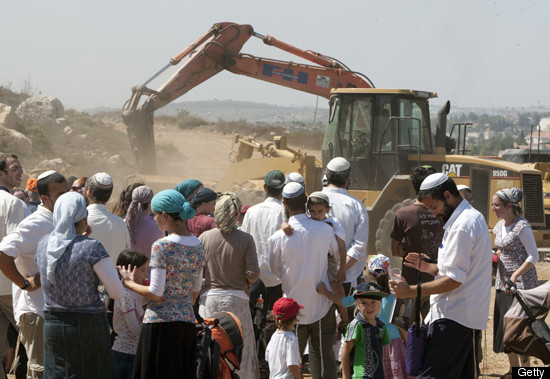
(AP) JERUSALEM — The Palestinian president said Monday he would wait at least a week before deciding whether to quit Mideast peace talks, giving U.S. mediators precious time to broker a compromise after Israel refused to extend its 10-month moratorium on new West Bank settlement construction.
President Mahmoud Abbas has repeatedly threatened to withdraw from the newly launched negotiations if Israel resumes building in the settlements. But with the stakes so high, Abbas said during a visit to Paris that he would not make any hasty decisions. He said he would consult with the Palestinian leadership before discussing the matter with representatives of the 22-member Arab League next Monday.
"We will not have any quick reactions," he said at a news conference standing beside French President Nicolas Sarkozy. "After this chain of meetings, we will be able to put out a position that clarifies the Palestinian and Arab opinion on this issue now that Israel has refused to freeze settlements."
The construction restrictions that the Israeli government ordered expired at midnight Sunday with no sign Israel was heeding U.S. and Palestinian pressure to keep the curbs in place.
That threw the peace talks, which only restarted three weeks ago, into doubt. But the Americans said they were still working with Israeli and Palestinian negotiators to find a formula that would keep the negotiations alive.
Abbas on Monday urged Israel to extend the settlement slowdown for three or four more months to allow for a discussion of "fundamental issues" in negotiations.
In Cairo, an Arab League official said Arab foreign ministers were expected to endorse whatever position Abbas took. He spoke on condition of anonymity because no decision had been made.
Jewish settlers in the West Bank jubilantly marked the end of the construction curbs on Sunday, sending thousands of blue and while balloons – the colors of the Israeli flag – into the air and breaking ground on a new kindergarten. They vowed to build thousands of new homes.
On Monday, there was only a smattering of construction in different settlements across the West Bank.
In Adam, north of Jerusalem, contractors surveyed building plans for new housing as a bulldozer cleared away earth. Another patch of land was prepared by a lone bulldozer in Karmei Tzur, in the southern West Bank, while four construction vehicles worked on leveling a rock and shrub covered plot in Ariel, a large settlement in the northern West Bank, to make the way for 100 homes planned in the area.
 Israeli settlers gather near a tractor on Monday at the construction site for 50 housing units in the West Bank settlement of Ariel.
Israeli settlers gather near a tractor on Monday at the construction site for 50 housing units in the West Bank settlement of Ariel.
 A Palestinian worker prays at a construction site of a new neighborhood on Monday in Ariel.
A Palestinian worker prays at a construction site of a new neighborhood on Monday in Ariel.
Settler leaders acknowledged construction activity would be minimal in the coming months, in part because banks and developers are reluctant to commit to new projects out of fear that building will be stopped again
Palestinians regard settlement as a major obstacle to peace because the construction is on land they claim for part of their future state. Some 300,000 Israeli settlers live in communities scattered across the West Bank, in addition to 180,000 Jewish Israelis living in east Jerusalem, the area of the holy city claimed by the Palestinians as their capital.
Immediately after the restrictions expired at midnight, Israeli Prime Minister Benjamin Netanyahu appealed to Abbas to keep negotiating.
Israeli defense officials said Defense Minister Ehud Barak has floated a proposal under which any future construction – even projects with all the necessary permits – would need his personal approval.
Under this scenario, Netanyahu would in effect be able to leave the building restrictions in place without openly declaring this. But it was not clear whether Netanyahu favors the idea. The defense officials spoke on condition of anonymity because no decision has been taken.
Under heavy U.S. pressure, Netanyahu persuaded his hard-line Cabinet to agree to the slowdown last November in a bid to bring the Palestinians back to the negotiating table after a breakdown of nearly two years.
The Palestinians initially dismissed the gesture because it did not halt construction on thousands of settlement apartments already under way. They also objected because it didn't officially apply to east Jerusalem – though there has been a de facto construction freeze there for months as well.
After U.S. mediated peace talks were launched earlier this month in Washington, the Palestinians demanded Israel maintain the curbs.
Netanyahu – a settlement champion who just last year grudgingly endorsed the notion of a Palestinian state – had faced heavy pressure within his pro-settler governing coalition to resume construction.
Any negotiations would be complicated by the rival Palestinian governments in the West Bank, which Abbas controls, and in the Gaza Strip, which is ruled by Islamic Hamas militants who overran the territory in June 2007.
On Monday, Hamas' top leader, Khaled Mashaal, said from his base in Syria that only minor issued remained for a full reconciliation with Abbas' Fatah movement. Mashaal did not elaborate, saying only that the two groups have taken "serious and real steps" toward reconciliation and would meet in early October in Cairo.
There was no immediate comment from Fatah.
Multiple efforts to reconcile the two sides have failed. Breakthroughs have been heralded before, only to fizzle. Reconciliation would likely require major concessions, including the integration of rival security forces, new elections and some sort of Hamas recognition of Israel's right to exist.
Hamas opposes peace talks with Israel and has threatened to spoil the latest round with violence.
___
AP writer Ben Hubbard in Jerusalem contributed to this report.